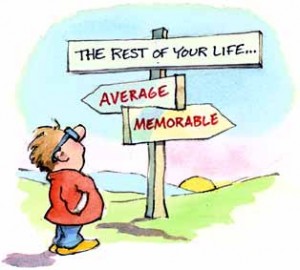 Late last week, I was having a conversation with a friend about life. He said he’s frustrated because he feels like he’s behind some of his peers at this stage in his life.
Late last week, I was having a conversation with a friend about life. He said he’s frustrated because he feels like he’s behind some of his peers at this stage in his life.
I don’t know if other cultures do this, but Americans tend to compare ourselves to others, particularly in terms of what we don’t have. You know, the whole keeping up with the Jones’s thing.
It’s hard not to do.
We also tend to think, “If I finally had X, I’d be happy.” But then when X happens, as it turns out we’re still not happy.
When I worked at FleishmanHillard, I was well on my way to making partner. I had the BMW and the six-figure salary and the title well in sight.
And then life happened. I got tired of seeing my ex-boyfriend flaunting around town with my ex-roommate and decided I had to get out of that city. I gave up all of those things I had worked so hard to achieve on my way up the corporate ladder because of a stupid, cheating boy.
But I did so to start a new journey. One that brought me to live in Chicago all by myself. One that taught me how to build a business under someone else’s watch. One that eventually led me to the man of my dreams.
But, still…
I look at my peers, who happen to be other business owners, and I think, “Why have I been doing this for eight years and they’ve only been doing it for five and they’re more successful than me?”
The Success Trap
It’s a very dangerous trap to get in. What is someone else’s definition of success should not be our own.
And yet, we continue to compare ourselves. Well, she runs a business and has kids and keeps herself in shape and cooks and cleans and, and, and. Or he started a business when he was younger than me and look where he is today. He doesn’t have to work anymore.
But what we don’t see is that her marriage is falling apart so she has to keep herself busy or she’ll dwell and become depressed. Or his wife is dying of cancer so he doesn’t have the luxury of work right now.
One of the things Sheryl Sandberg alludes to in “Lean In,” is woman can have it all, but her definition of it all is a family, a great marriage, and an executive-level position at a Fortune 500 company.
Does that mean the rest of us who don’t have those things aren’t successful?
That would be a big, fat no.
We have to define our own success and sometimes that means giving up the executive position at a Fortune 500 company to start a business that creates jobs…very slowly. Or it’s to stay home with kids so we can teach our future leaders. Or it’s to not get married to focus, instead, on a career or philanthropy or 16,000 other things.
This is a long way to get to an article Christopher Barger tagged me in on Facebook yesterday.
What Will You Regret?
“Top Five Regrets of the Dying” is an old one and you may have read it last year, but it still resonates really well.
The top five regrets are:
- I wish I’d had the courage to live a life true to myself, not the life others expected of me.
- I wish I hadn’t worked so hard.
- I wish I’d had the courage to express my feelings.
- I wish I’d stayed in touch with my friends.
- I wish I’d let myself be happier.
Ding, ding, ding!
Notice none of those things are I wish I’d had a BMW. I wish I’d had a six-figure salary. I wish I’d made partner at that PR firm in my 30s.
We are rational beings. We know these are the things we’ll regret, yet we continue to work 15 hour days (at least, I do) and chase after some big material purchase we can’t take with us when we die. We stay on the hamster wheel and we live to work instead of work to live.
I realize I can’t change an entire culture with one blog post, but I think it’s something worth thinking about for all of us.
What is one permanent change you can make in your life today to stop comparing yourself to others and live so you have no regrets when you die?